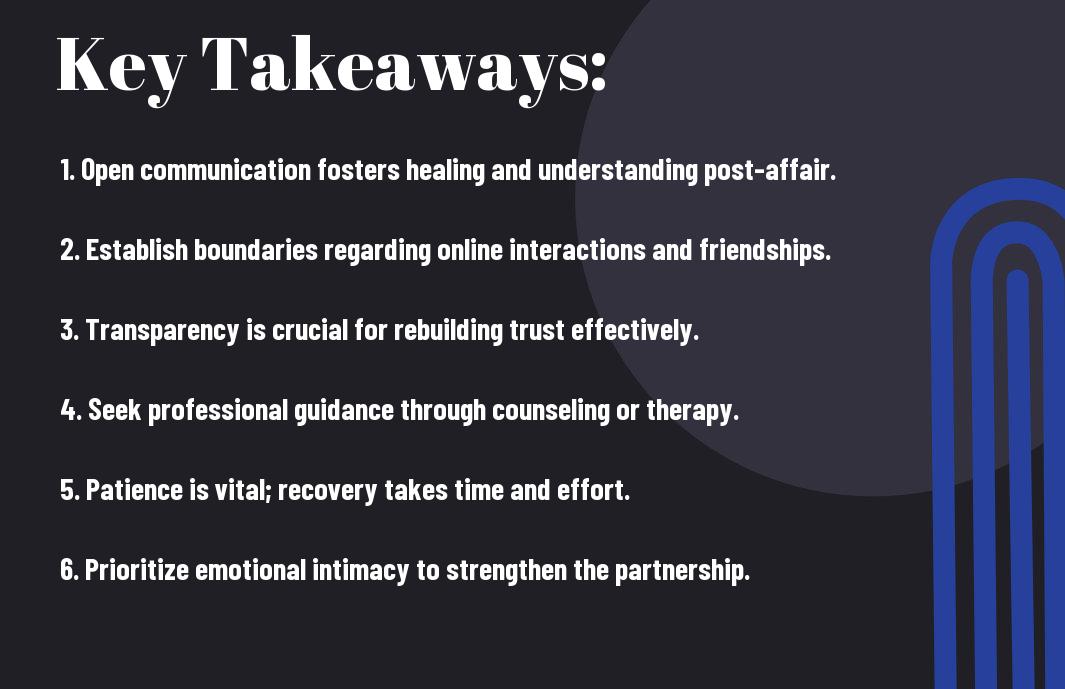Digital relationships can sometimes lead to unexpected challenges in your marriage, especially when an online affair occurs. If you find yourself in this situation, it’s imperative to approach the rebuilding of trust with honesty and open communication. You may feel hurt and angry, but understanding the underlying issues can help you foster a stronger bond moving forward. This guide will provide you with the tools and strategies to navigate this complex landscape and restore confidence in your partnership.

Key Takeaways:
- Open communication is imperative; both partners must share their feelings and concerns transparently.
- Establishing boundaries for online interactions can help rebuild trust and ensure both partners feel secure.
- Engaging in couples therapy may provide a structured environment for addressing underlying issues and improving the relationship.
- It’s important to acknowledge the emotional impact of the affair and allow each partner to process their feelings at their own pace.
- Rebuilding trust requires consistent actions over time, demonstrating commitment to change and honesty.
- Identifying triggers that lead to online infidelity can help both partners understand and avoid potential pitfalls in the future.
- Practicing empathy and forgiveness is key, helping both partners heal and move forward together.

Understanding Online Affairs
While navigating the digital landscape, it’s important to recognize the complexities of online affairs, which can manifest through various platforms and technologies. The anonymity and accessibility of the internet create opportunities for emotional connections that may transform into infidelity. Understanding these dynamics is vital for anyone seeking to rebuild trust in their relationship following such experiences.
The Nature of Digital Infidelity
Across countless platforms, digital infidelity often blurs the lines between emotional and physical betrayal. Virtual interactions can intensify feelings of intimacy, leading you to form connections that may feel more significant than they are, ultimately jeopardizing the trust within your marriage.
Common Triggers and Motivations
Online affairs can stem from various drivers within your relationship or personal life.
Understanding the underlying factors of online affairs can help identify why they happen. Often, they are driven by feelings of boredom, lack of emotional fulfillment, or desire for validation. The anonymity offered by digital platforms makes it easy for you to explore connections that you might not feel comfortable pursuing in real life. Additionally, escapism from unresolved issues in your marriage can lead to seeking companionship online as a way to fill gaps in your emotional needs. Recognizing these triggers can help you and your partner engage in meaningful conversations to address the root causes of infidelity.
The Impact of Online Affairs on Relationships
You may find that online affairs can significantly alter the dynamics of your relationship. These digital betrayals often lead to feelings of confusion, insecurity, and intense emotion, impacting both partners profoundly. As the lines between emotional and physical intimacy blur online, it becomes crucial to address the consequences that follow a digital transgression to foster healing and growth.
Emotional Consequences
Across various relationships, the emotional fallout from an online affair can be severe. Feelings of betrayal, shame, and guilt may overwhelm you and your partner, leading to heightened anxiety and depression. It’s crucial to recognize these emotions and address them openly to facilitate a supportive dialogue and work towards recovery together.
Trust Breakdown
With an online affair, the trust that once anchored your relationship can become severely compromised. The digital breach might leave you questioning everything, from your partner’s fidelity to their commitment to the relationship. As trust diminishes, communication falters, and intimacy shrinks, which can create a cycle of doubt and suspicion that is challenging to break.
Impact on your relationship is profound when trust erodes due to an online affair. The fear of future betrayal can lead to constant monitoring of each other’s digital activity, infringing on personal boundaries and causing emotional distress. Rebuilding this trust will require empathetic communication and a mutual willingness to address the underlying issues. Both partners must engage in open dialogues about their feelings and fears, allowing for a foundation of trust to be slowly re-established in this digital age.

Steps to Rebuild Trust
Now that you’ve decided to work on your marriage after an online affair, it’s important to take deliberate steps towards rebuilding trust. You can find helpful resources for Recovering from Online Infidelity. Focus on transparency, communication, and mutual understanding during this healing journey.
Open Communication
Against the common instinct to avoid uncomfortable discussions, you must prioritize open communication. Share your feelings honestly and allow your partner to express their thoughts. This dialogue is vital for understanding underlying issues and reinforcing trust.
Setting Boundaries
Below the surface of where trust was broken, establishing clear boundaries is important to prevent future infractions. You should openly discuss what is acceptable and what is not in your relationship moving forward.
Boundaries will help create a safe space for both you and your partner. They should define how you interact with others, ensuring that your partner feels secure. Discuss issues like social media use or friendships that may cause discomfort. Establishing these limits not only protects your relationship but also encourages a positive environment where trust can flourish again. When both partners feel respected, healing becomes easier.
Seeking Professional Help
Unlike traditional issues in a marriage, the complexities brought on by an online affair can require deeper understanding and intervention. When navigating the aftermath of infidelity, seeking professional help becomes vital to facilitate healing and communication without getting trapped in past grievances. Therapy can provide a safe space to explore feelings, rebuild trust, and create a joint path forward.
Couples Therapy
Help from a trained therapist can guide you and your partner through the emotional turmoil that follows an online affair. A professional can facilitate open dialogue and help you both articulate your needs and emotions, teaching valuable skills to foster intimacy and connection in your relationship.
Online Resources and Support Groups
After experiencing infidelity, tapping into online resources and support groups can be an effective way to gain new perspectives and coping strategies.
In addition to therapy, various online resources and support groups can provide the necessary assistance during this tough time. Websites and forums dedicated to relationship recovery allow you to connect with others who have experienced similar challenges. Engaging in these communities offers validation and practical advice while promoting healing through shared experiences. These platforms can help you learn from success stories, moving towards regaining trust in your marriage.
Re-establishing Intimacy
For couples rebuilding their relationship after an online affair, re-establishing intimacy is vital. It involves not just reconnecting physically, but also nurturing emotional bonds. This process requires open communication and vulnerability, allowing both partners to express their feelings and needs without fear of judgment. As you navigate this journey, focus on creating a safe space where you can share your thoughts and experiences openly.
Physical and Emotional Connection
Among the different facets of intimacy, the physical and emotional connections often go hand in hand. Engaging in honest conversations while also being mindful of your partner’s feelings can strengthen both aspects. You might want to initiate affectionate gestures or explore new activities that foster closeness. Balancing emotional support and physical touch will help rebuild trust over time.
Creating Shared Experiences
Before you try to fully reconnect, it’s important to focus on creating shared experiences. This can take the form of simple activities, like cooking together or taking walks, which allow you to rebuild trust through positive interactions. Engaging in new adventures or revisiting old favorites can promote bonding and remind both of you of the joy and companionship in your relationship.
Physical shared experiences can significantly impact your journey towards rebuilding intimacy. They provide opportunities for you to explore new dimensions of your relationship while fostering deep emotional connections. Whether it’s initiateing on a new hobby, planning a getaway, or simply enjoying a cozy movie night, these moments serve as reminders of your partnership. Be sure to prioritize activities that encourage laughter and joy, as these feelings can help alleviate tension from past hurts and reinforce your commitment to each other.
Moving Forward Together
All successful marriages require effort, especially after navigating the complexities of an online affair. As you launch on this journey of healing, focus on creating an open line of communication and establish healthy boundaries to rebuild your bond. This process takes time, patience, and understanding, but together, you can foster a stronger partnership that thrives in the digital age.
Future Planning
Behind every relationship is the shared vision of a future you both desire. Take this opportunity to set new goals together that prioritize emotional intimacy, shared experiences, and trust-building activities. By articulating your dreams and aspirations, you can reignite the passion in your marriage and restore a sense of connection that once felt lost.
Enhancing Relationship Resilience
Across the landscape of your relationship, enhancing resilience is vital to ensure lasting recovery. By developing coping strategies and reinforcing your emotional toolkit, you and your partner can adapt to challenges better and learn to grow stronger together. Seeking couples therapy or engaging in mutual activities can also bolster your bond as you navigate this new normal.
Together, you can cultivate resilience by openly discussing challenges and celebrating victories, no matter how small. Establishing a strong foundation involves communicating your feelings, practicing forgiveness, and investing in each other’s well-being. It’s necessary to acknowledge that setbacks may occur, but by remaining committed to your shared goals and nurturing your connection, you can develop a partnership that withstands the tests of time and adversity.
To wrap up
Hence, navigating the complexities of marriage after an online affair requires a foundational commitment to rebuilding trust. You must prioritize open communication, ensuring both you and your partner feel heard and valued. Establishing boundaries around digital interactions is imperative, as is engaging in mutual accountability. Consider professional guidance to help you both explore underlying issues and restore emotional intimacy. By actively working together to mend your relationship, you can foster a deeper, more resilient bond that thrives in the digital age.
FAQ
Q: What steps should we take immediately after discovering an online affair?
A: First, take time to process emotions rather than reacting immediately. It’s important to have open and honest discussions to understand what led to the affair. Consider seeking professional help, such as counseling, to facilitate these conversations and provide guidance on rebuilding trust.
Q: How can we rebuild trust after an online affair?
A: Rebuilding trust requires transparency, communication, and accountability. The unfaithful partner should be willing to share their feelings and experiences, while the betrayed partner should express their needs and concerns. Establishing boundaries and agreements for online activities can also help foster a sense of security.
Q: Is it possible to have a healthy relationship after an online affair?
A: Yes, many couples successfully rebuild their relationships after facing challenges like online affairs. This often involves a commitment to change and growth from both partners. With effective communication, understanding, and support, it’s possible to emerge from the experience with a stronger bond.
Q: What role does counseling play in healing from an online affair?
A: Counseling can provide a safe space for both partners to express their feelings and work through the complexities of the situation. A trained therapist can help guide difficult conversations, facilitate emotional healing, and teach effective communication skills that are vital for moving forward in the relationship.
Q: How do we navigate social media and online interactions after an affair?
A: Establishing clear boundaries regarding social media use and online interactions is crucial after an affair. Both partners should discuss and agree on what feels acceptable, which might include limiting interactions with certain individuals or adjusting privacy settings. Frequent communication about any issues arising can also help to maintain trust as you navigate the digital landscape.
